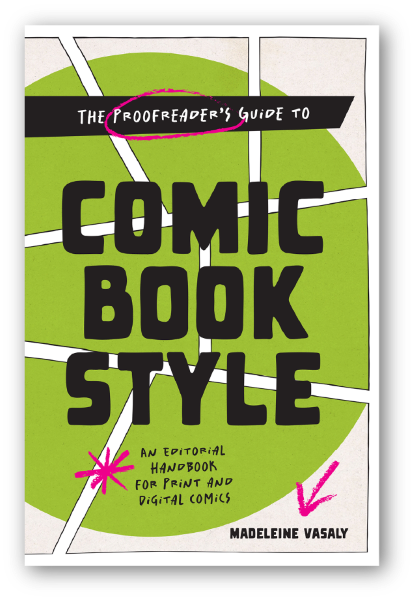Resources for Comics Editors and Proofreaders
As part of writing The Proofreader’s Guide to Comic Book Style, I put together a list of books, blogs, courses, and other resources that have been helpful to me or that trustworthy people have recommended. You’ll find it at the back of the book, but I also wanted to share an adapted version here for easy reference.
This post is meant as a helpful starting place and doesn’t pretend to be exhaustive. but if you think I’ve missed something important, I’d love to hear about it!
Emre Turkan
Books, Blogs, and More
I’ve created an affiliate list on Bookshop.org where you can find all the books listed below that are available on the platform, along with some brief notes on each one: Reference Shelf for Comic Book Editors and Proofreaders
Comics Editing and Style
Editing resources specific to comics, including graphic novels and manga.
Shelly Bond, Filth & Grammar: The Comic Book Editor’s (Secret) Handbook (Off Register Press, 2022)
Jan Mitsuko Cash, Editing Manga: Working with Translations in a Visual Medium (Editorial Freelancers Association, 2023)
Todd Klein, “Preparing Comics Scripts for Editing”
Fumiyo Kouno, Giga Town: A Guide to Manga Iconography (Udon Entertainment, 2024)
Scott McCloud, Making Comics: Storytelling Secrets of Comics, Manga, and Graphic Novels (William Morrow, 2006)
Nate Piekos, “Comic Script Basics”
Kenny Porter, “How to Easily Format a Comic Book Script” (2019)
Madeleine Vasaly, The Proofreader’s Guide to Comic Book Style: An Editorial Handbook for Print and Digital Comics (2024, forthcoming)
Douglas Wolk, Reading Comics: How Graphic Novels Work and What They Mean (Da Capo Press, 2008)
General Editing and Style
Resources helpful for both comics and other types of editorial work, including developmental editing, slang and dialects, inclusive language, and more.
Renni Brown and Dave King, Self-Editing for Fiction Writers (William Morrow, 2004)
BuzzFeed News, the BuzzFeed Style Guide
Bryan Garner, The Chicago Guide to Grammar, Usage, and Punctuation (University of Chicago Press, 2016)
Jonathon Green, Green’s Dictionary of Slang
Louise Harnby, “How to Convey Accents in Fiction Writing: Beyond Phonetic Spelling”
Jordan Kantey, “How to Write Accents and Dialects: 6 Tips”
Gretchen McCulloch, Because Internet: Understanding the New Rules of Language (Riverhead Books, 2020)
Katharine O’Moore-Klopf, Copyeditors’ Knowledge Base
Crystal Shelley, Conscious Language Toolkit for Editors and Conscious Language Toolkit for Writers (or see Crystal’s blog post collection on conscious language)
Amy J. Schneider, The Chicago Guide to Copyediting Fiction (University of Chicago Press, 2023)
Kia Thomas, A Very Sweary Dictionary (2020)
Karen Yin, The Conscious Style Guide (Little, Brown Spark, 2024)
Style Manuals
The most common style manuals used by comics publishers.
Lettering
As an editor or proofreader, it’s important to understand the fundamentals of lettering. These pros can teach you principles you can apply to reviewing pages or even help you start learning to letter comics yourself.
Blambot (Nate Piekos)
Comicraft (Richard Starkings and John Roshell)
Comic Book Lettering the Comicraft Way (Comicraft, 2003)
Todd Klein
Hassan Otsmane-Elhaou
Lettering List newsletter
Strip Panel Naked YouTube channel
Other Comics Creation and Publishing Topics
Writing, art, publishing, and more.
Brian Michael Bendis, Words for Pictures: The Art and Business of Writing Comics and Graphic Novels (Watson-Guptill, 2014)
Shelly Bond, Fast Times in Comic Book Editing (Off Register Press, 2023)
Will Eisner, Comics and Sequential Art (W. W. Norton & Company, 2008)
Will Eisner, Graphic Storytelling and Visual Narrative (W. W. Norton & Company, 2008)
David Harper, SKTCHD Off Panel podcast
Scott McCloud, Reinventing Comics (William Morrow, 2000)
Scott McCloud, Understanding Comics: The Invisible Art (William Morrow, 1993)
Greg Pak and Fred Van Lente, Make Comics Like the Pros (Watson-Guptill, 2014)
PanelxPanel online magazine
Chris Schweizer, “Tangents”
Matthew Shifrin, “Panel by Panel: Comic Book Access for the Blind,” Future Reflections 35, no. 3 (fall 2016)
Spin Weave and Cut, Accessible Comics for the Blind Project
Reimena Yee, the Creator’s Guide to Comics Devices
Looking for even more books? Check out my list of Eisner Award–Winning Books About Comics!
Education
Comics-Related Training
General Editing and Proofreading Training
Professional Associations and Discussion Spaces
Professional groups are a great way to connect with other people who do what you do, develop your skills, and find potential work. The three most prominent general associations for editors and proofreaders in North America are ACES: The Society for Editing, the Editorial Freelancers Association, and Editors Canada. There are also lots of locally and regionally based groups—both independent associations like the Professional Editors Network and the Northwest Editors Guild and chapters of national organizations. And there are groups based around specific identities and specialties.
Associations for writers and artists include the National Cartoonists Society, the Society of Children’s Book Writers and Illustrators, the Science Fiction and Fantasy Writers Assocation, and the Horror Writers Association.
There are also a wide variety of online communities that don’t require paid membership, including the Comic Book Editors Alliance and the Cartoonist Cooperative. You can find more in my list of online groups for editors.
For networking in person, you can’t beat conferences and conventions. Many of the associations mentioned here hold annual conferences. For comics-specific events, check out the comic cons and fan cons happening in your city. Maybe I’ll see you there!
Learn about common comics conventions and publishing workflows in The Proofreader’s Guide to Comic Book Style!

